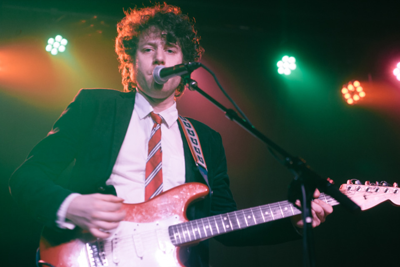
Quichenight at The Basement East, 12/11/2015
Recently Brett Rosenberg, the man behind Quichenight, posted this to a Facebook thread: “Albums are the new shows.” It’s a mentality the East Coast-raised songsmith and prolific home recordist has operated with since Quichenight’s 2010 inception. With that in mind, he’s issued a steady stream of LP-length collections of lovably warped pop music. But in this year of no shows, I wondered if Rosenberg was also referring to the diminishing returns of livestreamed concerts as we reach the dog days of quarantine. Are artists starting to decide that it’s better to craft something that can last rather than sinking a ton of time and effort into something that, even at its best, captures a fraction of the showgoing experience?
Just before the release of the synth-heavy, aloof and whimsical Tesago — out today, it’s the third Quichenight album since the stay-at-home order went into effect, fourth in the past year and 13th total — I called Rosenberg up. Check out the album and our conversation below. (It's Bandcamp Friday, by the way, meaning that the platform is waiving its cut of sales.) And keep up with his website, as well as Instagram, Facebook and Twitter.
Can you elaborate on “Albums are the new shows”?
Livestreams put me back into that dying world, without alcohol and your friends getting you through the door. What it comes down to is, we’re writers. In the time it takes to rehearse for a tour and go on tour, you could make three albums. Records are going to take less time to make [now] because you’re going to crave that candid spontaneity of the live performance. I’ve always been a critic of making [recording] into self-glorification, fixing all your mistakes. You’ve got to give the audience a little credit. Records are smaller things than people make them out to be.
What’s some art you’ve been enjoying during this time?
I got into Van Halen. There’s just an interesting detail in every part of their story. David Lee Roth is a genius. I’m not an Eddie Van Halen fan. But I love the rhythm section, the songs, how those records sound. It’s open, not claustrophobic.
Where does Tesago fit into the Quichenight pantheon?
I’ve always viewed Quichenight as soundtrack music; this album is more like “hold music.” There’s a phone system I’ve designed around the album, with the music and some characters I made up. It tells a story. I like to make instrumentals that are jams, but with a melody, a mantra.
Yeah, some of these songs really jam it out.
I discovered the synthesizer. I’m in a nostalgic, gooey-eyed ’80s place. I’m lucky to be a person old enough to have had a point in their lives where they were innocent and didn’t know anything. My dad died a few years ago. He worked at the Radio Shack in 1987 at the mall. I want these recordings to feel like it’s 1987, my grandma dropped me off at the mall and I’m walking to get to the Radio Shack where my dad works. That’s the vibe I was going for.
I think you nailed it. Is Tesago a place? A state of mind?
A bastardized Native American word for “courage”… a shady business out of Lander, Wyo. … or the name of the elementary school in Clifton Park, N.Y., that I went to. It could be any one of the three.
Tell me about “Music Heaven.”
There is this world that’s never going to come back quite the same as it was. … But with a home studio, you can make something in this pop music tradition that’s evolved throughout the history of recorded music. There’s just so many elements in recording, the repetition of particular moments, a mistake that might not feel right on the first listen, but then you’re prepared for it the next time. When you’re making a record, it isn’t about the first time people hear it, but the last time they hear it. You want to delay the last time they hear it.





